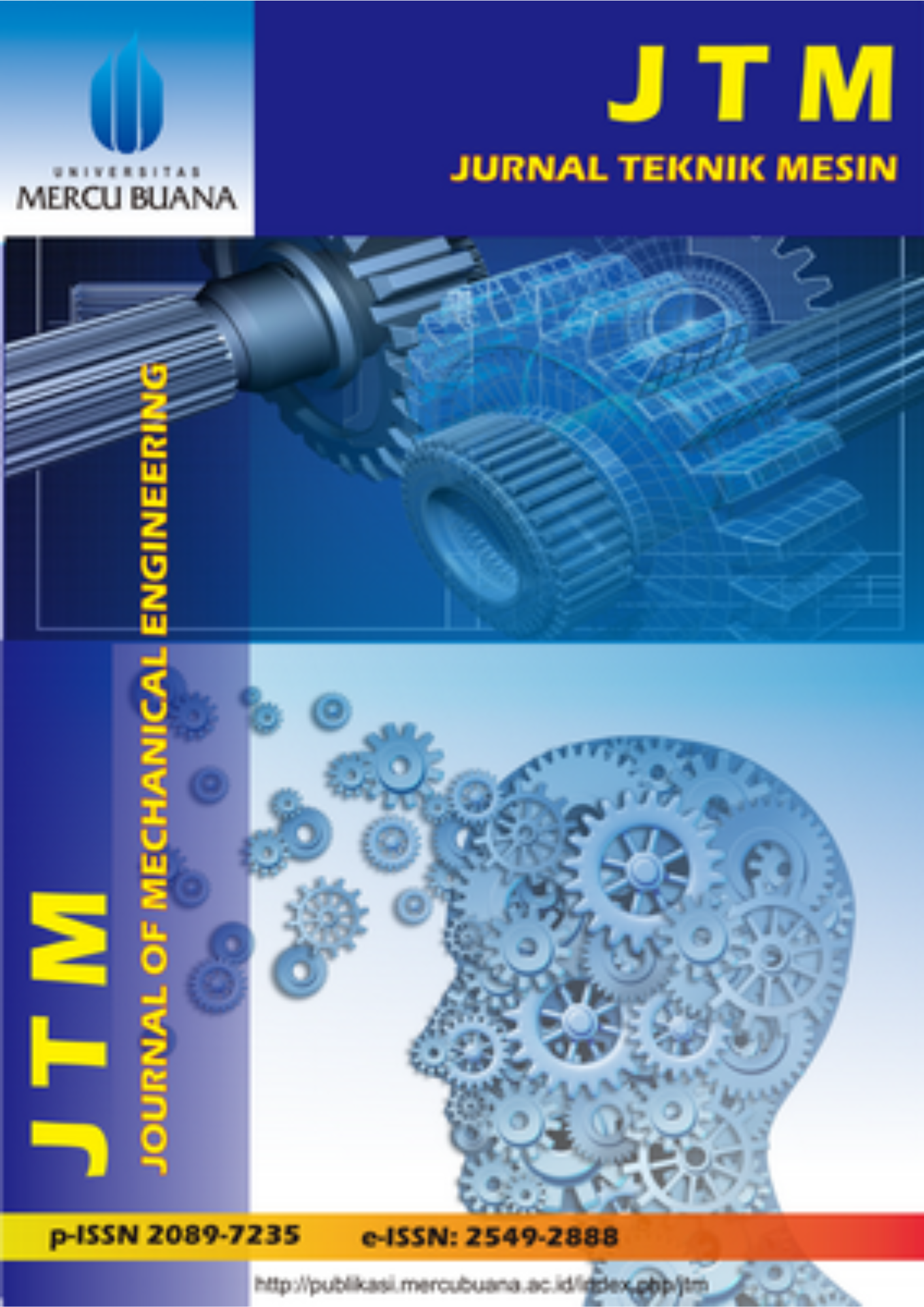Analysis of Variation in Fiber Volume Fraction on Torsional Strength of Epoxy and Polyester Matrix Coconut Fiber Composites
Abstract
Natural fibers can be employed to enhance the strength and rigidity of composite structures. These fibers can be combined with matrix materials to create composite materials. One specific example of a natural fiber is coconut fiber. Unfortunately, coconut fiber is currently underutilized, leading to organic waste. However, coconut fiber offers several advantages as a substitute for automotive product composites despite facing specific technical challenges. Hence, it is important to understand the potential of coconut fiber composites with epoxy and polyester matrices. This study aimed to assess the capabilities of coconut fiber composites with epoxy and polyester matrices through a torsion test. The study involved conducting torsion tests on composites with varying volume fractions, precisely 25:75, 30:70, 35:65, and 40:60 (coconut fiber fraction to polyester/epoxy fraction). The research entailed creating torsion test specimens and performing the torsion tests. Subsequently, an analysis of the torsion test results was conducted. This research indicates that coconut fiber with an epoxy matrix demonstrated a maximum stress value of 31.27 MPa and a maximum shear strain value of 1.022 rad at a 30% volume fraction. Similarly, coconut fiber composite with a polyester matrix exhibited a maximum stress value of 27.83 MPa and a maximum shear strain value of 0.91 at a 30% volume fraction. Based on these outcomes, it can be concluded that the optimal volume fraction of coconut fiber for producing satisfactory specimens is 30%, regardless of whether the composites have epoxy or polyester matrices.
Keywords
Full Text:
PDFReferences
. W. N. Hanif, Y. Estriyanto, and D. S. Wijayanto, “Pengaruh Fraksi Volume Serat Gelas Terhadap Ketahanan Bakar Komposit Dengan Matriks Ripoxy R-802 EX,” Jurnal Nosel, vol. 2, no. 4, 2014.
. B. Maryanti, A. A. Sonief, S. Wahyudi, “Pengaruh Alkalisasi Komposit Serat Kelapa-Poliester Terhadap Kekuatan Tarik,” Jurnal Rekayasa Mesin, vol. 2, no. 2, 2011.
. B. E. Kacaribu and O. P. Alves, “Analisis Sifat Mekanis kawat Aluminium Seri 1100 – H14 Hasil Pengerjaan Dingin,” Jurnal Online Sekolah Tinggi Teknologi Mandala, vol. 13, no. 1, September, 2018.
. Zulkifli, Z., Hermansyah, H., & Mulyanto, S. (2018). Analisa Kekuatan Tarik dan Bentuk Patahan Komposit Serat Sabuk Kelapa Bermatriks Epoxyterhadap Variasi Fraksi Volume Serat. JTT (Jurnal Teknologi Terpadu), 6(2), 90. https://doi.org/10.32487/jtt.v6i2.459
. Oktarina, K., & Indriyanti, Y. (2020). Analisis pengaruh kuat arus terhadap uji bending pad a pengelasan plat kapal tanker dengan gap 2 mm sesuai dengan aplikasi wps di PT. daya radar utama lampung. Jurnal Inovator, 3(1), 8–13. https://doi.org/10.37338/ji.v3i1.90
. M. Fitri, “Pengaruh Beban Lentur Pada Poros Stainless Steel Terhadap Siklus Kegagalan Fatik,” Jurnal Teknik Mesin, vol. 9, no. 3, pp. 149–155, Oct. 2020.
. E. A. Nugroho, “Proses pembuatan dan uji kualitas baut tipe FB 6XL MC3 G7S K10 SIM,” JURNAL REKAYASA MESIN, vol. 21, no. 2, pp. 39–46, September, 2021.
. K. Aliyon, A. Hajinezhad, and M. Mehrpooya, “Energy assessment of coal-fired steam power plant, carbon capture, and carbon liquefaction process chain as a whole,” Energy Convers. Manag., vol. 199, p. 111994,2019,doi:10.1016/j.enconman.2019.111994.
. M. S. Faiz and N. S. Drastiawati, “Pengaruh Fraksi Volume dan Arah Serat Komposit Hibrid Fibre Metal Laminate (FML) Bermatrik Polyester 157 BQTN-EX terhadap Kekuatan Tarik dan Bending,” Jurnal Teknik Mesin UNESA, vol. 9, no.1, pp. 37-46, Januari, 2021.
. J. L. Marpaung and R. Kusuma, “Pengaruh Komposisi Serat Kelapa terhadap Kekerasan, Keausan, dan Koefisien Gesek Bahan Kopling Gesek Kendaraan,” Jurnal Poros Teknik Mesin Unsrat, vol. 6, no. 2, pp. 151-162, Oktober, 2017.
DOI: http://dx.doi.org/10.22441/jtm.v14i1.20828
Refbacks
- There are currently no refbacks.
Copyright (c) 2025 Jurnal Teknik Mesin
Jurnal Teknik Mesin (JTM)
Program Studi Teknik Mesin, Fakultas Teknik, Universitas Mercu Buana
Jl. Meruya Selatan No. 01, Kembangan, Jakarta Barat 11650, Indonesia
Email: [email protected]
Telp.: 021-5840815/ 021-5840816 (Hunting)
Fax.: 021-5871335
JTM is indexed by the following abstracting and indexing services:

This work is licensed under a Creative Commons Attribution-NonCommercial 4.0 International License.






.png)







_(486_x_90_px)_(486_x_190_px)_(486_x_190_px)_(4).png)
_(486_x_90_px)_(486_x_190_px)_(486_x_190_px)_(5).png)
2.png)
.png)